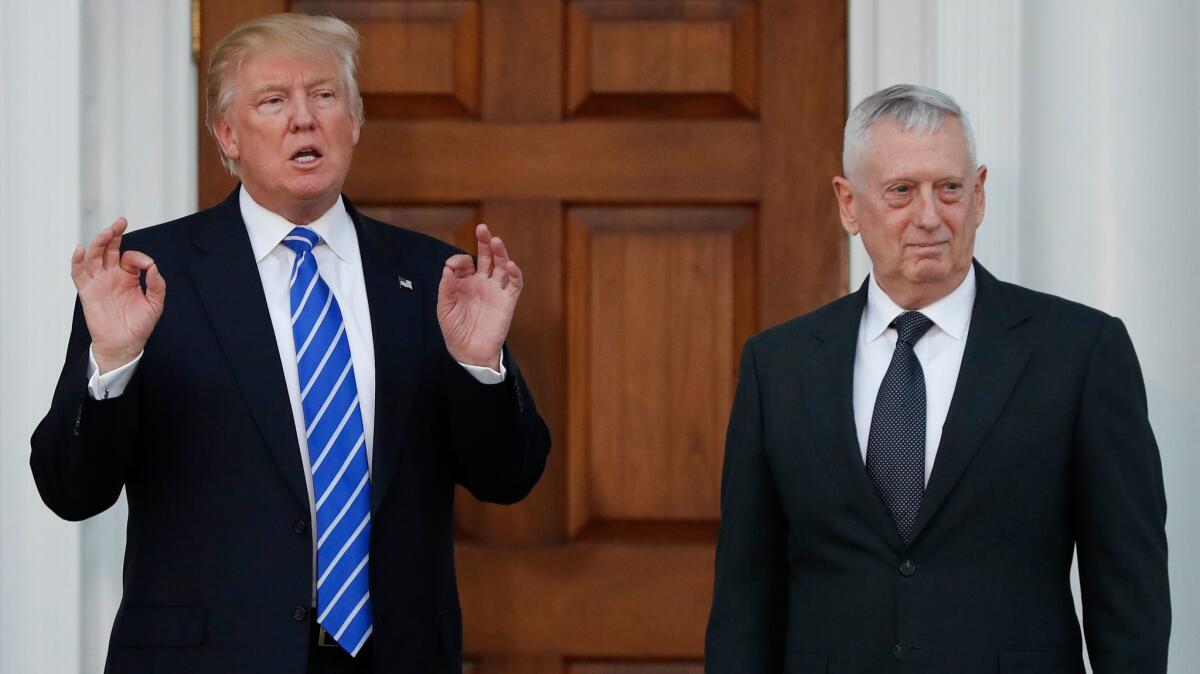Op-Ed: Why Trump needs James ‘Mad Dog’ Mattis

When President-elect Donald Trump announced that James N. Mattis was his choice to lead the Department of Defense, what seemed to delight him most was the retired general’s Iraq war nickname: “Mad Dog.”
“Mad Dog Mattis!” Trump told a post-election rally. “Mad Dog. He is great, he is great…. They say he is the closest thing to Gen. George Patton that we have.”
Over the next few weeks, we’re going to hear a lot about Mattis’s prowess as a combat commander and his salty exhortations to the troops he led.
“Be professional, be polite, but have a plan to kill everyone you meet,” he told his Marines. (A pretty good definition of what combat forces are for, actually.)
Trump needs Cabinet officers who are willing to stand up to him and push back when he’s wrong. Mattis has already done that.
And he incautiously told a partly-civilian audience that fighting is “a hell of a hoot. ... It’s fun to shoot some people.” (He apologized for that one.)
But if Trump chose Mattis for his mad-dog reputation, he made a good choice for the wrong reason.
Yes, Mattis was a Marine who demanded “ferocity” from his troops in battle. But he’s also a strategic thinker and scholar who ordered his officers to read military history, can quote Marcus Aurelius or Ulysses S. Grant — and never much liked the “mad dog” sobriquet his men bestowed on him in Anbar province.
Off the battlefield, he’s soft-spoken, thoughtful, cautious — and, most important, un-Trumplike.
Indeed, Mattis has already disagreed with many of the foreign policy positions Trump adopted without evidence of deep study during his campaign.
Trump has suggested that the United States should adopt an “America First” foreign policy, shedding excess obligations and spending less on traditional alliances. Mattis has called for “continued engagement in the world” and “stronger alliances,” and said Trump’s dismissal of the North Atlantic Treaty Alliance was “kooky.”
When Trump called for a ban on Muslims entering the United States, Mattis said the proposal caused “great damage” to U.S. relationships in the Middle East. (Trump later softened the policy to “extreme vetting.”)
Trump has suggested that Vladimir Putin’s Russia could be a U.S. ally; Mattis considers Putin a major threat, and believes the U.S. should do more to help Ukraine.
And, as Trump himself reported, Mattis told the president-elect to his face that he was wrong to suggest that U.S. forces should torture suspected terrorists for information. “Give me a pack of cigarettes and a couple of beers, and I’ll do better,” the general told the president-elect.
Trump and Mattis also differ on Iran, which could set up one of the new administration’s first big foreign policy debates.
Trump has said dismantling Obama’s 2015 nuclear arms deal with Tehran would be his top priority. Mattis says that’s simply impractical.
“There’s no going back,” Mattis said in April. “I don’t think that we can take advantage of some new president’s [arrival] and say we’re not going to live up to our word on this agreement. I believe we would be alone if we did, and unilateral economic sanctions from us would not have near the impact of an allied approach.”
Instead, he said, the priority should be to keep pressure on Iran to curb its intervention in the rest of the Middle East, and to deter Iran from abandoning the nuclear agreement in the years ahead.
“I think we’re going to have to hold at risk the nuclear program in the future — in other words, make plans now of what we’d do if in fact they restarted,” he said.
There’s one big problem with Mattis’s nomination: the law that prohibits a former military officer from being secretary of Defense unless he or she has been retired for at least seven years.
It’s a sensible law, meant to guarantee the principle of civilian control, and it’s only been waived once before, for George C. Marshall in 1950. Marshall was an extraordinary case: the chief of staff who organized victory in World War II and then served as a successful secretary of State.
This is an extraordinary case for a different reason: Trump needs Cabinet officers who are willing to stand up to him and push back when he’s wrong. Mattis has already done that.
And Trump needs someone to balance the influence of his other favorite general, the volcanic Michael Flynn, who will be his national security advisor. Mattis and Flynn, who know each other well, are likely to go head-to-head on a long list of issues. (According to one report, Flynn wasn’t thrilled with the idea of nominating Mattis, who outranked him four stars to three. Generals remember details like that.)
Trump’s infatuation with generals — he boasted frequently in the campaign about their support — sometimes takes on an odd fanboy tone. (“Mad Dog!”)
But in this case, it might be a good thing. When Mad Dog Mattis tells Trump that blowing up the Iran nuclear agreement, weakening alliances, bombing civilians or reinstating torture is a bad idea, the boss might actually listen.
Twitter: @DoyleMcManus
Follow the Opinion section on Twitter @latimesopinion and Facebook
MORE FROM OPINION
Looted by Nazis, then seized from my dining room
Through climate change denial, we’re ceding global leadership to China
Half the firearms in the U.S. are owned by 3% of adults, and that means trouble for the NRA
More to Read
A cure for the common opinion
Get thought-provoking perspectives with our weekly newsletter.
You may occasionally receive promotional content from the Los Angeles Times.











